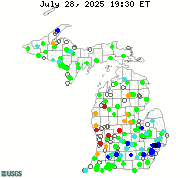Michigan Water Science Center
CURRENT CONDITIONS
DATA CENTERReal-time data Historical data
ABOUT THE Michigan
|
Michigan Water Science Center Director's Welcome MessageDirector, James R. MorrisAs Director for the U.S. Geological Survey, Michigan Water Science Center, I am committed, along with the rest of the Michigan staff, to help provide the hydrologic information and understanding needed for the optimum use and management of Michigan's waters. The USGS is unique among Government organizations because we have neither regulatory nor developmental authority--our sole product is impartial, credible, relevant, and timely information, equally accessible and available to all interested parties. I would like to take this opportunity to explain some of our programs. Water-resource activities of the Michigan Water Science Center are conducted statewide from three offices by a highly trained staff that consists of more than 50 hydrologists, geologists, engineers, biologists, physical scientists, hydrologic technicians, and a variety of support personnel. Michigan Water Science Center investigates the occurrence, distribution, quantity, movement, and chemical and biological quality of Michigan's surface and ground water. Specific water resources activities of the Michigan Water Science Center include (1) maintenance and analysis of long-term quantitative and qualitative data for streams, reservoirs, and ground water; and (2) shorter-term interpretative investigations of specific water-resource issues, such as: ground-water contamination, availability, and protection; pathogen and fecal-indicator contamination and transport in surface water and ground water; analysis of floods and flood potential; and ground-water supply and movement. Funds to support our work are from three sources, including joint-funding agreements with State, local, and tribal agencies, Federal funds from the USGS appropriations, and reimbursable funding from other Federal agencies. Jointly funded programs (programs that may be matched by USGS Cooperative Water Program) are considered when the study is mutually advantageous to the USGS and the State, local, or tribal agencies. These cooperative, jointly funded programs are reviewed and renegotiated annually to ensure that they are responsive to the needs of the State and localities and to the national priorities of the USGS. We are very interested in hearing about your water-resource needs and working together to help you make decisions based on objective and credible information in your roles as managers, scientists, policy makers, and other interested citizens of the State. If you would like more information, please contact me or any of the Michigan staff. James R. Morris, Director |